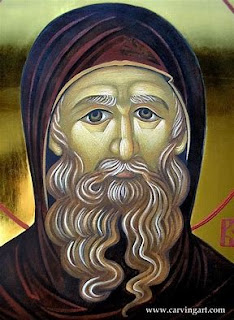January 17th, is the feast day of St. Antony (or Anthony) the Great who lived from AD 251-356 in Egypt. Last week we began a series of articles on his life. Much of our information comes from the biography of Antony written about AD 360 by St. Athanasius of Alexandria.
Antony was born in Koma in Lower Egypt to
wealthy landowner parents. His parents were faithful Christians, raising him to
be the same. He had just one sibling, a younger sister.
Athanasius writes, “But when he was grown
and arrived at boyhood, and was advancing in years, he could not endure to
learn letters, not caring to associate with other boys; but all his desire was
... to live a plain man at home.” Though living at home, he was never idle. And
although Antony never learned to read, he had a fantastic memory from what he
heard orally, especially from the Bible. He regularly attended the Liturgy at
“the Lord’s House” (church) with his parents, “attentive to what was read,
keeping in his heart what was profitable in what he heard.”
“And though as a child brought up in
moderate affluence,” Athanasius writes, “he did not trouble his parents for
varied or luxurious fare, nor was this a source of pleasure to him; but was
content simply with what he found, nor sought anything further.” A young person
contented with what God had given him, wanting no more.
But then tragedy struck. Both of his
parents died; we don’t seem to know the details. But suddenly Antony was an
orphan. He was only about 18 or 20. Now he was responsible for his sister, as well as for the home and
property.
Surely he must have often wondered, “Lord,
what next? What will you have me do?”
Athanasius tells us what happened next: “Now it was not six months after the death of his parents, and going according to custom into the Lord's House, he communed with himself and reflected as he walked how the Apostles [Matthew 4:20] left all and followed the Savior; and how they in the Acts [Acts 4:35], sold their possessions and brought and laid them at the Apostles' feet for distribution to the needy, and what and how great a hope was laid up for them in heaven.
“Pondering over these things, he entered
the church, and it happened the Gospel was being read, and he heard the Lord
saying to the rich man [Matthew 19:21], 'If you would be perfect, go and sell
that you have and give to the poor; and come follow Me and you shall have
treasure in heaven.'
“Antony, as though God had put him in mind
of the Saints, and the passage had been read on his account, went out
immediately from the church, and gave the possessions of his forefathers to the
villagers–it was three hundred acres, productive and very fair–that they should
be no more a clog upon himself and his sister. And all the rest that was
movable he sold, and having got together much money, he gave it to the poor,
reserving a little however for his sister's sake.”
So St. Antony was not just a “hearer” of
the Gospel, but a “doer” also (James 1:22).
And raised with Christian values and
virtues, with love of simplicity and contentment in home life, he felt his
wealthy inheritance to be a “clog,” an impediment. He was content to simply
give the land to all the villagers.
What was the “clog,” the impediment to what? To living the Gospel? We shall find out next week.
Dibby Allan Green

